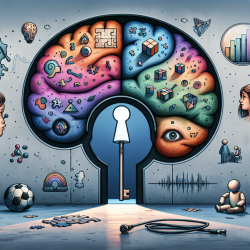Introduction
As practitioners dedicated to enhancing children's mental health and development, we are always on the lookout for evidence-based interventions that can make a significant difference. The study titled Martial Arts as a Mental Health Intervention for Children? Evidence from the ECLS-K provides valuable insights into the potential impact of martial arts on children's mental health outcomes. This blog post aims to explore the findings of this study and encourage practitioners to consider how these insights might influence their work with children.
The Study at a Glance
The research utilized data from the Early Childhood Longitudinal Study, Kindergarten class of 1998-1999 (ECLS-K), to assess whether participation in martial arts could improve mental health outcomes such as self-esteem, self-confidence, concentration, and self-discipline. These outcomes were measured through teacher ratings of classroom behavior over time.
Key Findings
The study found no statistically significant effect of martial arts participation on children's classroom behavior. The effect size for martial arts was effectively zero, suggesting that martial arts, as practiced on average in the U.S., does not contribute to measurable improvements in the targeted mental health outcomes.
Implications for Practitioners
While the study's findings may seem disheartening for those hoping to leverage martial arts as a mental health intervention, they offer several important takeaways:
- Evidence-Based Practice: This study underscores the importance of relying on data-driven decisions when considering interventions. While martial arts may not improve classroom behavior, it is crucial to continue exploring other evidence-based practices that can.
- Holistic Approach: Mental health interventions should be comprehensive, addressing various aspects of a child's life. Martial arts might still play a role in a broader strategy focused on physical fitness, self-defense, or personal development outside the classroom.
- Customized Interventions: The study highlights the variability in martial arts instruction. Practitioners should consider the specific focus and teaching style of martial arts programs when recommending them as part of a child's development plan.
Encouraging Further Research
The study calls for more targeted research to explore the nuances of martial arts as an intervention. Future studies could focus on specific styles, teaching methodologies, or long-term participation to better understand potential benefits.
Conclusion
While martial arts may not directly enhance classroom behavior, they could still offer other benefits that contribute to a child's overall well-being. Practitioners are encouraged to continue seeking out and implementing interventions that are supported by robust evidence, always aiming to create the best possible outcomes for children.
To read the original research paper, please follow this link: Martial arts as a mental health intervention for children? Evidence from the ECLS-K










